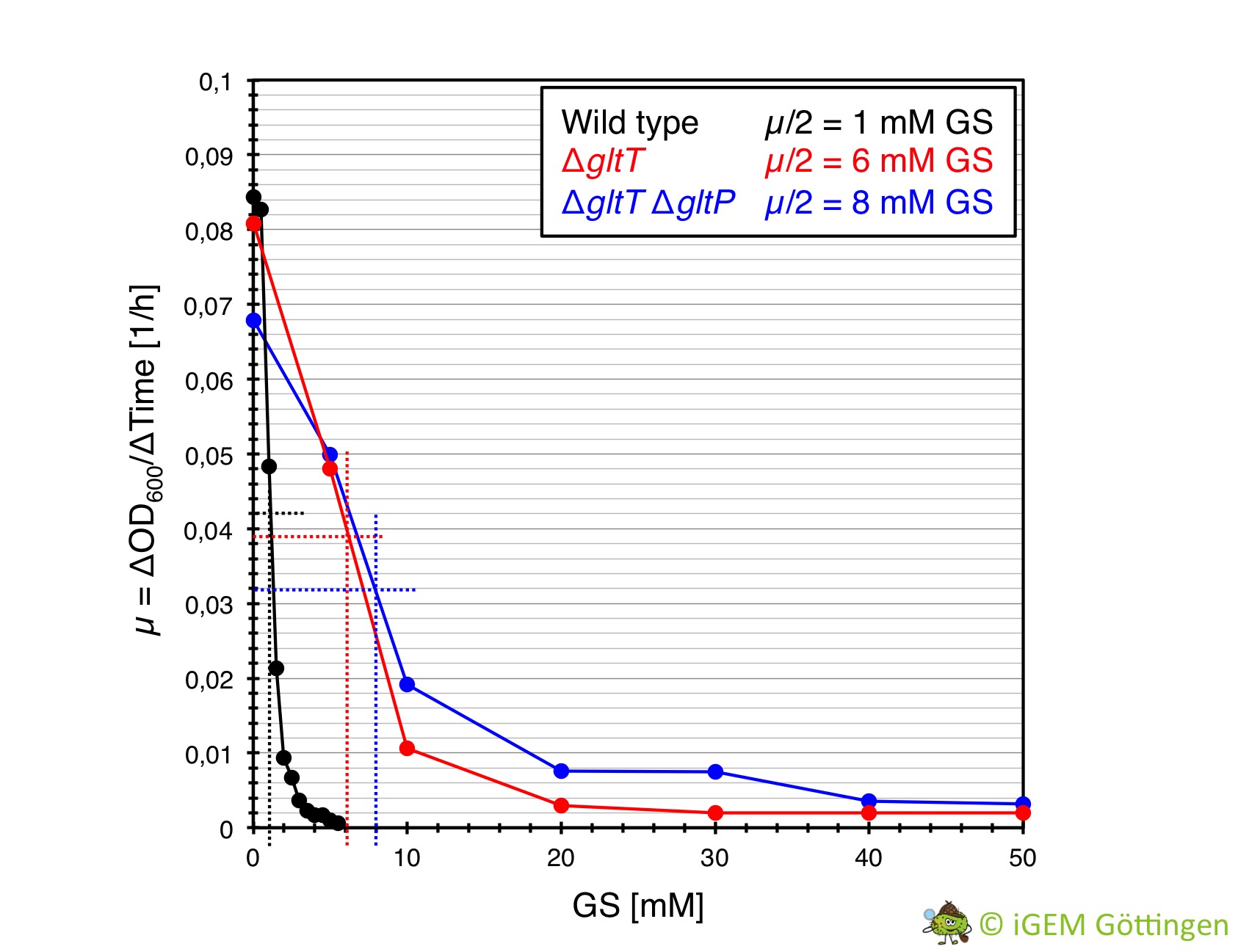Difference between revisions of "Part:BBa K2586001"
FMCommmichau (Talk | contribs) |
|||
| Line 7: | Line 7: | ||
Bacteria lacking the <i>gltT</i> gene are highly resistant to glyphosate because the herbicide is not transported into the cell. This part could be useful to engineer bacteria for the uptake and degradation of the weedkiller. | Bacteria lacking the <i>gltT</i> gene are highly resistant to glyphosate because the herbicide is not transported into the cell. This part could be useful to engineer bacteria for the uptake and degradation of the weedkiller. | ||
| + | |||
| + | <u>Deletion of <i>gltT</i> confers glyphosate tolerance </u> | ||
| + | |||
| + | We tested whether the clean deletion of the <i>gltT</i> gene sufficient to confer high-level resistance of B. subtilis to glyphosate. For this purpose, we constructed the mutant strain BP233 (<i>gltT</i>). To assess the glyphosate resistance of the <i>gltT</i> mutant, we cultivated the bacteria in CS-Glc minimal medium supplemented with increasing amounts of glyphosate. As shown in Figure 1A, growth of the wild type was inhibited by 5 mM glyphosate. The transporter with a high-affinity for glyphosate seems to be in fact GltT because the deletion of the gltT gene conferred high-level resistance to the herbicide (Figure 1C). Moreover, the growth rates of the strain BP233 (<i>gltT</i>) were reduced by 50% at herbicide concentrations of 6.1 mM (Figure 1B). Thus, in comparison to the wild type strain, 6-fold higher glyphosate concentration is needed to reduce the growth rate of the strain BP233 (<i>gltT</i>) by 50%. | ||
| + | |||
| + | |||
| + | <u>Double mutant <i>gltT gltP</i> shows even higher glyphosate tolerance </u> | ||
| + | |||
| + | In order to test whether the deletion of both gltT and gltP confers an even higher glyphosate tolerance, we constructed the mutant strain BP235 (<i>gltT gltP</i>). We cultivated the bacteria in CS-Glc minimal medium supplemented with increasing amounts of glyphosate. As shown in Figure 1D, the double deletion increased the glyphosate tolerance to 8.0 mM. Therefore, an 8-fold higher glyphosate concentration is needed to reduce the growth rate of the strain BP235 (<i>gltT gltP</i>) by 50%. | ||
| + | |||
| + | [[File:T--goettingen--iC50.jpg|1000px|center|thumb|'''Fig. 1.''' TESTESTEST]] | ||
<!-- Add more about the biology of this part here | <!-- Add more about the biology of this part here | ||
Revision as of 10:10, 22 September 2018
GltT: glutamate and glyphosate transporter in B. subtilis
This part is coding for a glutamate and glyphosate transporter. The DNA sequence of the gltT gene is coding for the GltT transporter, which is responsible for glutamate uptake into the cell. We found that GltT is also involved in glyphosate uptake in the Gram-positive model bacterium Bacillus subtilis.
Bacteria lacking the gltT gene are highly resistant to glyphosate because the herbicide is not transported into the cell. This part could be useful to engineer bacteria for the uptake and degradation of the weedkiller.
Deletion of gltT confers glyphosate tolerance
We tested whether the clean deletion of the gltT gene sufficient to confer high-level resistance of B. subtilis to glyphosate. For this purpose, we constructed the mutant strain BP233 (gltT). To assess the glyphosate resistance of the gltT mutant, we cultivated the bacteria in CS-Glc minimal medium supplemented with increasing amounts of glyphosate. As shown in Figure 1A, growth of the wild type was inhibited by 5 mM glyphosate. The transporter with a high-affinity for glyphosate seems to be in fact GltT because the deletion of the gltT gene conferred high-level resistance to the herbicide (Figure 1C). Moreover, the growth rates of the strain BP233 (gltT) were reduced by 50% at herbicide concentrations of 6.1 mM (Figure 1B). Thus, in comparison to the wild type strain, 6-fold higher glyphosate concentration is needed to reduce the growth rate of the strain BP233 (gltT) by 50%.
Double mutant gltT gltP shows even higher glyphosate tolerance
In order to test whether the deletion of both gltT and gltP confers an even higher glyphosate tolerance, we constructed the mutant strain BP235 (gltT gltP). We cultivated the bacteria in CS-Glc minimal medium supplemented with increasing amounts of glyphosate. As shown in Figure 1D, the double deletion increased the glyphosate tolerance to 8.0 mM. Therefore, an 8-fold higher glyphosate concentration is needed to reduce the growth rate of the strain BP235 (gltT gltP) by 50%.
Sequence and Features
- 10COMPATIBLE WITH RFC[10]
- 12COMPATIBLE WITH RFC[12]
- 21COMPATIBLE WITH RFC[21]
- 23COMPATIBLE WITH RFC[23]
- 25INCOMPATIBLE WITH RFC[25]Illegal NgoMIV site found at 742
Illegal NgoMIV site found at 1123 - 1000COMPATIBLE WITH RFC[1000]

